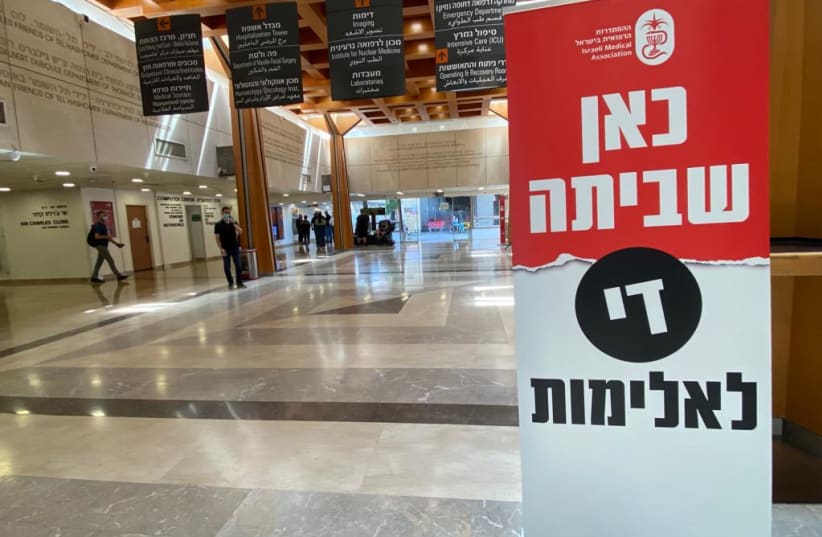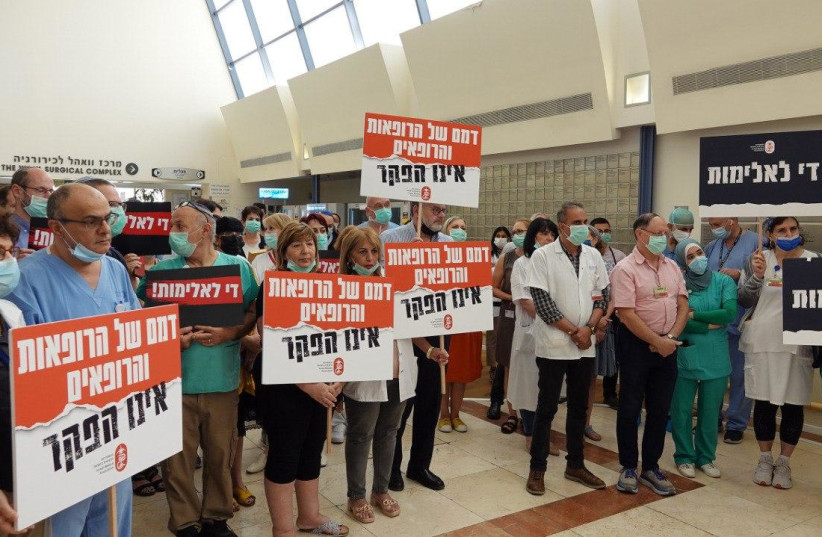Medical staff across the country started a 24-hour-strike on Thursday morning in response to violent incidents at both Hadassah-University Medical Center on Jerusalem’s Mount Scopus and Galilee Medical Center in Nahariya.
Public hospitals across Israel will be operating in “Shabbat mode” for the duration of the strike, meaning they will not perform non-urgent elective surgeries or run outpatient clinics.
In addition to the hospitals, the country’s four HMOs – Clalit Health Services, Maccabi Healthcare Services, Meuhedet Health Maintenance Organization and Leumit Health Care Services – will also participate in the strike, shutting their community clinics, with the exception of urgent cases.
A statement issued by Maccabi condemned the violence faced by healthcare workers in recent days, and said that they have “zero tolerance for violence of any kind.”
The HMO also reported various projects in cooperation with the Health Ministry and the Public Security Ministry aimed at increasing security at its medical clinics. Maccabi added that its medical staff would be free to participate in the strike for as long as necessary.
“Maccabi will continue to stand by all its medical teams that work day and night for the health of the public,” said the statement.
The demands laid out by the Israel Medical Association ahead of the strike included police presence in emergency rooms, increased and improved security systems in hospitals and medical clinics, and changing legislation so that attacking a medical staff member would be treated the same as attacking a uniformed police officer.
Justice Minister Gideon Sa’ar spoke with IMA chairman Prof. Zion Hagai on Thursday afternoon.
The strike was implemented following two violent incidents at hospitals earlier in the week. On Monday, a man in his 20s was arrested at the Hadassah-University Medical Center for attacking staff and destroying hospital property. On Wednesday evening, family members of a deceased motorcycle crash victim attempted to break into the trauma center at Galilee Medical Center.
“The bleeding of doctors will not be ignored,” said Hagai. “And for as long as the government does not take immediate action, we will not hesitate to intensify our measures.”
By Thursday afternoon, Hagai reported that he had spoken with Sa’ar about establishing a course of action to combat the wave of violence against medical staff.
“There is no doubt that the most effective response to the epidemic of violence requires a set of measures including a significant change of approach to enforcement and punishment, including legislative changes,” Hagai said following the meeting.
Sa’ar said his office will examine various measures to increase the punishment against those who act violently toward medical staff, with a focus on the specific demands laid out by the IMA.
However, even as the strike was under way, violence toward medical staff continued. A police report on Thursday showed that a man in his 50s had been arrested after threatening a medical staff member in the surgical ward of Soroka-University Medical Center in Beersheba.
In addition to the strike itself, medical staff arranged for rallies and protests to be held outside hospital buildings throughout the day on Thursday, including at Shaare Zedek Medical Center in Jerusalem, Samson Assuta Ashdod Hospital and Bnai Zion Hospital in Haifa.
Assuta Ashdod director-general Dr. Erez Barenboim issued a statement saying, “Violence against medical staff has become a routine occurrence,” and extended his support for the strike and protest. “It is inconceivable that those who work day and night for patients should also learn to defend themselves,” he said.
Joining the protest outside Hadassah-University Medical Center on Mount Scopus was Hagai, who called on Prime Minister Naftali Bennett to immediately implement measures to prevent further violence against medical staff. He said that hospitals have experienced “a tsunami of violence” in recent days.
“We will not give up the fight until the personal safety of medical staff is restored,” said Hagai.

